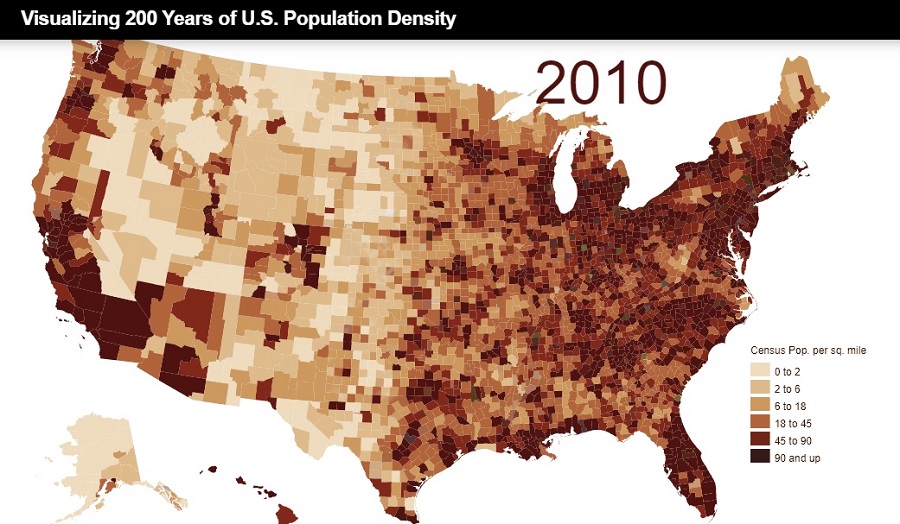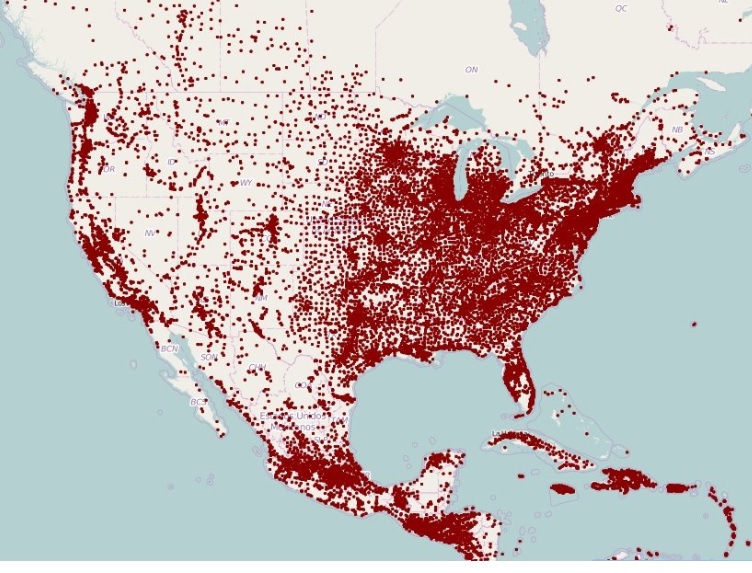greybeard
Well-known member
It's pretty much apples to oranges when one compares a contemporary pandemic to those 50+ and 100+ years ago.
Both of the flu epidemics discussed had one thing in common. We were in real shooting wars. World War1 and in the case of the '68 flu pandemic, we were heavily involved in the cold war, with plans still on the pentagon table to be able to fight 2 wars simultaneously in 2 different theaters of operation (in Europe against the USSR and against China in the Pacific..and of course, by '68 we had over 1/2 million of our own troops in Vietnam. Shutting down would have been very difficult to do and still support those operations.
In 1917, 103 years ago, our population density looked completely different than it does today, so not as much distancing was needed.

By 2010, it looked like this:

Today, it's even more dense. About 94 people per sq mile vs 28 people per sq mile in 1917.

Even so, social distancing isn't new.
https://www.nationalgeographic.com/history/2020/03/how-cities-flattened-curve-1918-spanish-flu-pandemic-coronavirus/
The conclusion from link above:
Dramatic demographic shifts in the past century have made containing a pandemic increasingly hard. The rise of globalization, urbanization, and larger, more densely populated cities can facilitate a virus' spread across a continent in a few hours—while the tools available to respond have remained nearly the same. Now as then, public health interventions are the first line of defense against an epidemic in the absence of a vaccine. These measures include closing schools, shops, and restaurants; placing restrictions on transportation; mandating social distancing, and banning public gatherings. (This is how small groups can save lives during a pandemic.)
Of course, getting citizens to comply with such orders is another story: In 1918, a San Francisco health officer shot three people when one refused to wear a mandatory face mask. In Arizona, police handed out $10 fines for those caught without the protective gear. But eventually, the most drastic and sweeping measures paid off. After implementing a multitude of strict closures and controls on public gatherings, St. Louis, San Francisco, Milwaukee, and Kansas City responded fastest and most effectively: Interventions there were credited with cutting transmission rates by 30 to 50 percent. New York City, which reacted earliest to the crisis with mandatory quarantines and staggered business hours, experienced the lowest death rate on the Eastern seaboard.
In 2007, a study in the Journal of the American Medial Association analyzed health data from the U.S. census that experienced the 1918 pandemic, and charted the death rates of 43 U.S. cities. That same year, two studies published in the Proceedings of the National Academy of Sciences sought to understand how responses influenced the disease's spread in different cities. By comparing fatality rates, timing, and public health interventions, they found death rates were around 50 percent lower in cities that implemented preventative measures early on, versus those that did so late or not at all. The most effective efforts had simultaneously closed schools, churches, and theaters, and banned public gatherings. This would allow time for vaccine development (though a flu vaccine was not used until the 1940s) and lessened the strain on health care systems.
The studies reached another important conclusion: That relaxing intervention measures too early could cause an otherwise stabilized city to relapse. St. Louis, for example, was so emboldened by its low death rate that the city lifted restrictions on public gatherings less than two months after the outbreak began. A rash of new cases soon followed. Of the cities that kept interventions in place, none experienced a second wave of high death rates. (See photos that capture a world paused by coronavirus.)
In 1918, the studies found, the key to flattening the curve was social distancing. And that likely remains true a century later, in the current battle against coronavirus. "[T]here is an invaluable treasure trove of useful historical data that has only just begun to be used to inform our actions," Columbia University epidemiologist Stephen S. Morse wrote in an analysis of the data. "The lessons of 1918, if well heeded, might help us to avoid repeating the same history today."
So, some of you can continue to grasp at straws as you see fit, exchanging other people's lives for $$$$$$$$ and even more obvious, hoping the economy recovers enough in time to ensure the incumbent gets re-elected. I believe he will, but in swing states where the death toll has been high, the issue is in doubt. He basically won by a margin of about 107,000 votes in 3 states. Pa, Wisconsin, and Michigan. As it stands now, those 3 states account for over 228,000 covid cases and over 14,000 deaths. I do not look for him to repeat in those states. He will have to make it up elsewhere. A candidate can often overcome a poorly performing economy but dead people linger in the minds of voters. Keep in mind, that many voters voted against HRC in part because they blamed her forthe death of 4 people in Benghazi..what do you think will go thru people's minds when there are 140,000+ deaths, and it is increasing on average of about 1000 per day with about 100 days before election day? Those of you that don't care about the number of deaths, well, the results are going to be on you, as you are supporting re-opening the country and more than likely increasing that daily new death rate even more.. The relatives and loved ones of those dead people vote too.
Both of the flu epidemics discussed had one thing in common. We were in real shooting wars. World War1 and in the case of the '68 flu pandemic, we were heavily involved in the cold war, with plans still on the pentagon table to be able to fight 2 wars simultaneously in 2 different theaters of operation (in Europe against the USSR and against China in the Pacific..and of course, by '68 we had over 1/2 million of our own troops in Vietnam. Shutting down would have been very difficult to do and still support those operations.
In 1917, 103 years ago, our population density looked completely different than it does today, so not as much distancing was needed.

By 2010, it looked like this:

Today, it's even more dense. About 94 people per sq mile vs 28 people per sq mile in 1917.

Even so, social distancing isn't new.
https://www.nationalgeographic.com/history/2020/03/how-cities-flattened-curve-1918-spanish-flu-pandemic-coronavirus/
The conclusion from link above:
Dramatic demographic shifts in the past century have made containing a pandemic increasingly hard. The rise of globalization, urbanization, and larger, more densely populated cities can facilitate a virus' spread across a continent in a few hours—while the tools available to respond have remained nearly the same. Now as then, public health interventions are the first line of defense against an epidemic in the absence of a vaccine. These measures include closing schools, shops, and restaurants; placing restrictions on transportation; mandating social distancing, and banning public gatherings. (This is how small groups can save lives during a pandemic.)
Of course, getting citizens to comply with such orders is another story: In 1918, a San Francisco health officer shot three people when one refused to wear a mandatory face mask. In Arizona, police handed out $10 fines for those caught without the protective gear. But eventually, the most drastic and sweeping measures paid off. After implementing a multitude of strict closures and controls on public gatherings, St. Louis, San Francisco, Milwaukee, and Kansas City responded fastest and most effectively: Interventions there were credited with cutting transmission rates by 30 to 50 percent. New York City, which reacted earliest to the crisis with mandatory quarantines and staggered business hours, experienced the lowest death rate on the Eastern seaboard.
In 2007, a study in the Journal of the American Medial Association analyzed health data from the U.S. census that experienced the 1918 pandemic, and charted the death rates of 43 U.S. cities. That same year, two studies published in the Proceedings of the National Academy of Sciences sought to understand how responses influenced the disease's spread in different cities. By comparing fatality rates, timing, and public health interventions, they found death rates were around 50 percent lower in cities that implemented preventative measures early on, versus those that did so late or not at all. The most effective efforts had simultaneously closed schools, churches, and theaters, and banned public gatherings. This would allow time for vaccine development (though a flu vaccine was not used until the 1940s) and lessened the strain on health care systems.
The studies reached another important conclusion: That relaxing intervention measures too early could cause an otherwise stabilized city to relapse. St. Louis, for example, was so emboldened by its low death rate that the city lifted restrictions on public gatherings less than two months after the outbreak began. A rash of new cases soon followed. Of the cities that kept interventions in place, none experienced a second wave of high death rates. (See photos that capture a world paused by coronavirus.)
In 1918, the studies found, the key to flattening the curve was social distancing. And that likely remains true a century later, in the current battle against coronavirus. "[T]here is an invaluable treasure trove of useful historical data that has only just begun to be used to inform our actions," Columbia University epidemiologist Stephen S. Morse wrote in an analysis of the data. "The lessons of 1918, if well heeded, might help us to avoid repeating the same history today."
So, some of you can continue to grasp at straws as you see fit, exchanging other people's lives for $$$$$$$$ and even more obvious, hoping the economy recovers enough in time to ensure the incumbent gets re-elected. I believe he will, but in swing states where the death toll has been high, the issue is in doubt. He basically won by a margin of about 107,000 votes in 3 states. Pa, Wisconsin, and Michigan. As it stands now, those 3 states account for over 228,000 covid cases and over 14,000 deaths. I do not look for him to repeat in those states. He will have to make it up elsewhere. A candidate can often overcome a poorly performing economy but dead people linger in the minds of voters. Keep in mind, that many voters voted against HRC in part because they blamed her forthe death of 4 people in Benghazi..what do you think will go thru people's minds when there are 140,000+ deaths, and it is increasing on average of about 1000 per day with about 100 days before election day? Those of you that don't care about the number of deaths, well, the results are going to be on you, as you are supporting re-opening the country and more than likely increasing that daily new death rate even more.. The relatives and loved ones of those dead people vote too.
